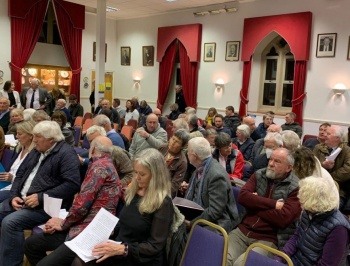The role of the Constables
and the parish assembly
A parish assembhly
|
Origin obscure
The parish is of very ancient origin, being constituted at the time when the churches were built. The civil chief of the parish is the Constable, the origin of this office being doubtful. Both Falle, the historian, and Le Geyt, the commentator, are silent on this matter; other writers go on to say that it is of English origin and is similar to the office of High Constable.
In France the Connétable was a high military official. Francis Hugo says that the office is not Norman. In the Charter of Henry VII, 1495, there is a clause enacting that the Constables of each parish are to be freely elected by the parishioners, without any recommendation of the Captain or Jurats. But in spite of this order there were occasions when the Governor nominated Constables.
Originally their term of office was not limited; some remained for life; in some instances the office became hereditary. Very often a Constable became a Jurat, and until a successor was found, the Jurat continued to act as Constable. In 1621 it was ordered that after three years in office the Constable had to apply to the Court for a new election.
In 1669 the Constables were ordered to attend the Royal Court once a month to report on any complaints in their parish. In their respective parishes they were in charge of the arms and ammunition belonging to the Militia. Very often the Constable was an officer of the Militia. In case of an alarm the Constable had to keep candles ready in the churches to be lit for militiamen of the parish to muster there with their food and blankets, ready to be sent to the rendezvous; if the alarm lasted more than a day he had to assist in feeding the militiamen on duty.
Duties
The Constable presides over the Parish Assembly; he is the Mayor of his parish, head of the police [1], and often settles simple disputes and differences. It is his duty to see that order is preserved; he is assisted by centeniers, who are also elected by the people for three years; by vingteniers and by constable's officers, who are elected for a longer period [2].
The Constable and centeniers have the right of arresting, and even of imprisoning with the consent of the Jurats, but in cases of imprisonment a written report of the whole case must be, without loss of time, made to the Court. All reports of the centeniers must in the first instance be addressed to the Constable, who presents them to the Court. [3]
The Constable, by virtue of his office, is a member of the States of the Island, and when any new laws are submitted to the Assembly it is left to him, should he think fit, to refer the matter to his constituents. The Constable must reside in his parish.
In the oath which the Constable has to take before the Royal Court he swears that he will keep the King's Peace and suppress and arrest those who interrupt the public peace, presenting them before the Courts to be dealt with; that he will protect all rights belonging to the parish; and will attend to the general welfare of his parishioners, with the advice of the principals and officers of the parish; that he will, through his centeniers, call together the officers of the parish once a month to discuss parish affairs; and to be informed of any crimes and infractions of the various regulations in order to report to the Court from time to time. He will also carry out all orders he may receive from the Lieut-Governor, the Bailiff or the Jurats, in execution of their office, and will assist at the Assembly of the States when called upon.
Parish assembly
The parish assembly is a meeting of all electors [4] and ratepayers of a parish. The Rector, churchwardens, almoners, members of the Honorary Police, and any Jurat or Crown Officer living in the parish are members ex officio
Functions
The assembly:
- Sets the annual domestic rate according to the budget proposed by the Constable;
- Elects members of the municipality, including the Roads Committee, Roads Inspectors, Vingteniers, Constable's Officers
- Recommends liquor licences to the licensing bench
- Adopts road names
- Authorises the Procureurs du Bien Public to enter into contracts in the name of the parish
- May discuss other matters as proposed by the Constable, or at the written request of a number of members of the assembly
History
The origins of the parish assembly are lost in the mists of time. In 1787 the States passed a law to provide for all ratepayers of a parish to elect a committee to administer parochial affairs. The Privy Council, having evidently been lobbied by vested interests, ruled that the law should be struck down on the grounds that the breadth of suffrage infringed on the prerogatives of those who considered themselves Principals:
- "At the Court of St James's 8 August 1787: For by that Act the Ancient and immemorial Constitution of the Parochial Assemblies, which has always been composed of the Principal Inhabitants, the Constables and other Officers of the parishes, overturned and the Assembly thrown open to all the Inhabitants that pay rates or Contribute to the Publick taxes and at the same time that it admits into the Assembly such a Multitude of Voters and makes them competent to determine all matters that may legally come before a Parochial Assembly, Yet they are ordered as soon as possible to elect a Committee for the purpose of facilitating and expediting such Business as requires a particular discussion, and this Committee is to Continue for three Years."
The Privy Council recommended that the uncertainty over the membership of the Parish Assembly be cleared up instead, and the institution be placed on a statutory footing. An 1804 law on parish assemblies was passed therefore which defined the membership of the assembly as being of the Connétable, Rector, officers, and principals paying at least 20 quarters.
In 1975 membership of the Assembly was extended to all electors.
Notes and references
- ↑ Although the title of Mayor was briefly popular in the 19th century in St Helier, it has long fallen out of use. The role of Constable bears little resemblance to that of an English Mayor, and although closer to that of the French maire, is also significantly different from it. The Constable is no longer considered the head of the parochial police. That is the responsibility of the senior centenier, who holds the title Chef de Police
- ↑ All parochial officials now serve threee-year terms
- ↑ This paragraph is largely historic. Centeniers retain the power of arrest, indeed they are the only people, States paid police included, who have that right. However, anyone arrested who is not to be released on bail pending a Court appearance may be detained overnight but must be presented in Court the following day. A centenier presents the accused in Court and the Constable is no longer involved
- ↑ Membership of the assembly was only extended to all electors in 1975. Previously it was restricted to ratepayers assessed above a certain level

